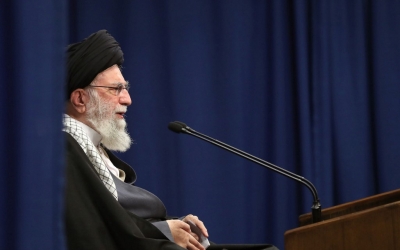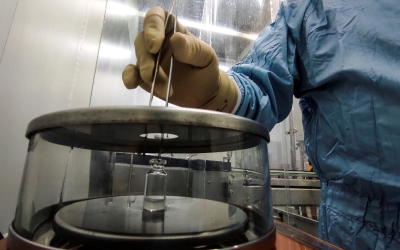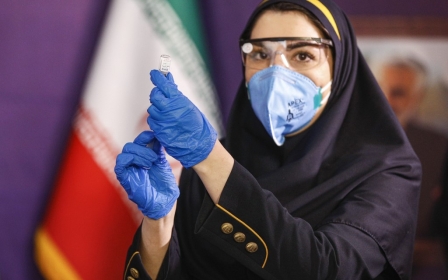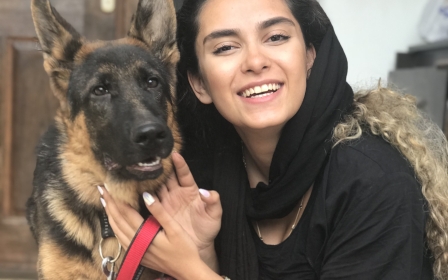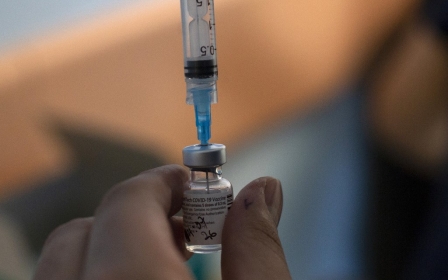Covid-19: Positive test results are the new VIP party pass in Iran
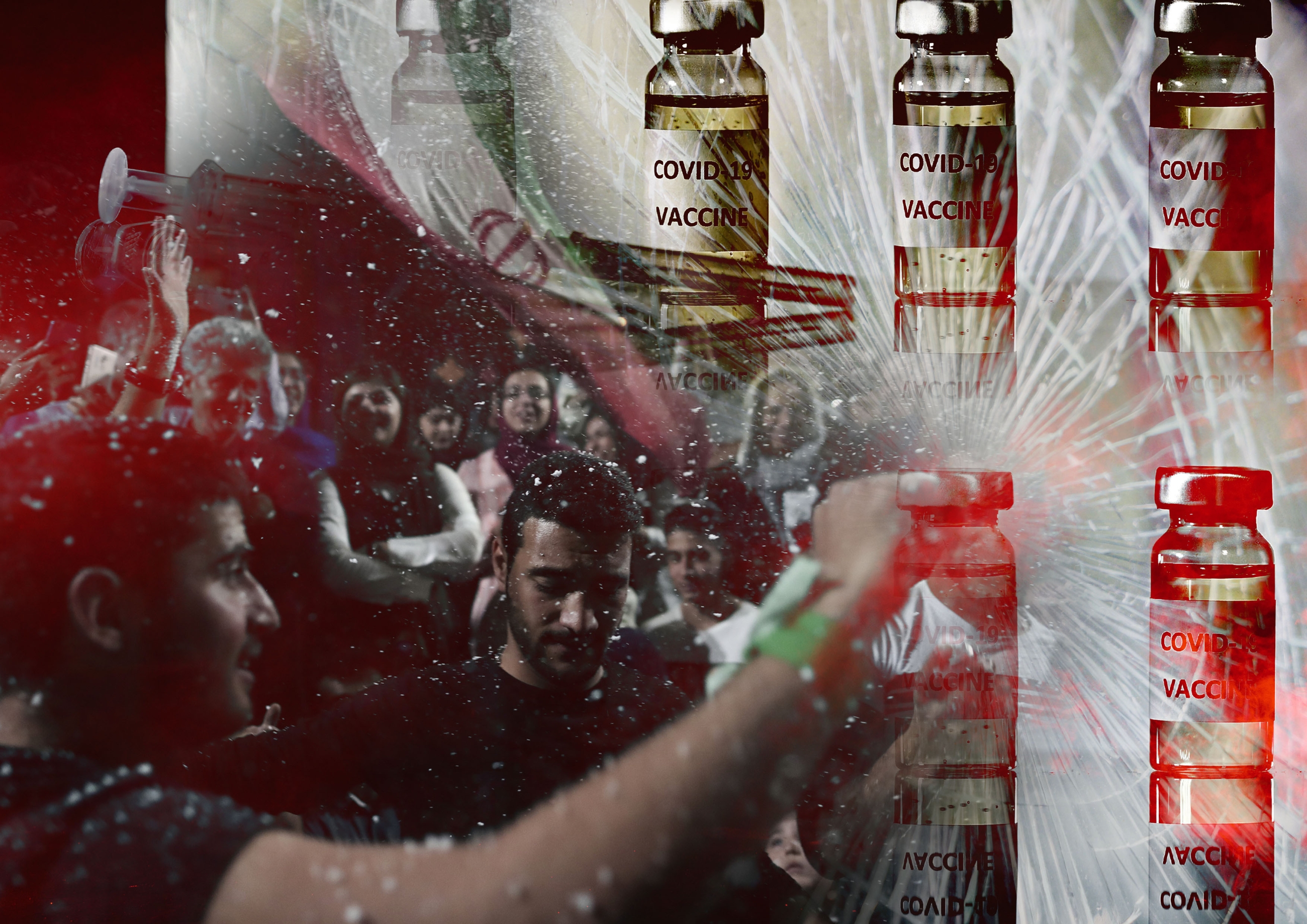
The coronavirus antibody test has become a hot commodity among restless Iranian youths who long for life outside their home's four walls.
The serology test examines the body's immune response to Covid-19 infection by measuring the number of antibodies against the virus in blood samples from both symptomatic and asymptomatic individuals.
In 2021, a positive test result can serve another purpose: it's an access pass to the "antibody parties" that are springing up across the capital, Tehran.
'If the results were positive, it meant that there was no danger to them or to us [of being infected], and we could have fun together'
- Mitra, 24, 'antibody party' host
Twenty-four-year-old Mitra said she was tired of lockdown restrictions and wanted a reason to feel joy. So she decided to hold a party and invite some of her friends.
The party had an unusual prerequisite.
New MEE newsletter: Jerusalem Dispatch
Sign up to get the latest insights and analysis on Israel-Palestine, alongside Turkey Unpacked and other MEE newsletters
"Those who wanted to attend my party should have taken an antibody test beforehand and sent me the results to see if there were antibodies in the blood," Mitra said about her event.
"If the results were positive, it meant that there was no danger to them or to us [of being infected], and we could have fun together."
Coronavirus antibody testing has become commonplace in Iran. It costs about 1,200,000 rials ($5) and can be obtained by visiting private laboratories or hospitals. The antibodies against Covid-19 are usually detectable in the first few weeks after infection, according to the World Health Organisation.
Citing anecdotal experiences, revellers claim that the antibodies prevent people from catching the virus a second time, enabling them to bypass some of the government-imposed restrictions and claw back a little bit of normalcy in life.
Mitra, who has a bachelor's degree in food science, told Middle East Eye that she had contracted coronavirus last year and could not breathe normally for about two months. However, now that she's recovered, she believes she's immune to the virus.
"After you've caught it [Covid-19] once, you develop antibodies and there will not be a second time," she insisted with confidence, without providing evidence.
To support her claim, Mitra said her sister, who works as a nurse in a Tehran clinic, had reached the same conclusion about antibodies and immunity after "searching online a lot about the virus".
Since the first case of Covid-19 was detected in Iran last February, the country has been battling the pandemic with little success.
The prolonged pandemic has exhausted and frustrated everyone in Iran. Young people say they are tired of the closure of restaurants, cinemas and other places of entertainment. The parties are just a tool to help them get through these monotonous days.
"You tell me what to do? How long are we going to isolate ourselves inside our homes? We are tired of this damn virus,” said Mehrdad, a 23-year-old graphic arts student who has been attending antibody parties.
"For a year now, our lives have been filled with masks and hand sanitisers. We cannot visit anyone, nor we can hug our friends. Nor it is clear at all when the vaccine will arrive in Iran, and even when it is available, it is not clear whether it can be used or not," he told MEE.
Where are the vaccines?
With more than 100 million Covid-19 cases confirmed worldwide, and over 2.2 million deaths, scientists have been scrambling to develop vaccines against the virus in record time.
The United Kingdom and the United States are among the first in the world to introduce coronavirus vaccines, but Tehran has explicitly banned the import of jabs developed by these two countries and even cancelled 150,000 donated doses of the Pfizer vaccine from the US.
"Imports of US and British vaccines into the country are forbidden... They're completely untrustworthy," Iranian Supreme Leader Ayatollah Ali Khamenei said in a speech in January.
"They [the Americans and the British] want to test their vaccine on other nations."
Vaccine doses would instead be imported from countries with closer ties to Iran, such as Russia, China and India, Khamenei added.
Soon afterwards, Iran launched a strategic alliance with Cuba and established a collaborative framework under which the Cuban vaccine will be developed between Iran's Pasteur Institute and Cuba's Finlay Institute of Vaccines. Both countries are under stringent US sanctions, with Cuba freshly added to the US State Department's list of "terrorism sponsors".
Scientists believe that even partial immunity can slow the spread of the disease and reduce the severity of symptoms. Hence the delay of coronavirus vaccination has caused concerns among Iranians, with some warning of a possible rise in the death toll if American and British vaccines, including those from Pfizer-BioNTech, Moderna and Oxford, are not used.
According to official figures released by Iran's health ministry, more than 58,180 people in the country have died from Covid-19 and more than 1,438,280 people have been infected as of 3 February. Members of the opposition claim that the real numbers are much higher.
Fake test results
For those who make it through the door, the antibody parties are not too different from any social gatherings in the pre-pandemic era: people go to drink, dance and be merry.
While some people may still have reservations about the effectiveness of antibody protection, that has not stopped them from having some fun.
"I know there is a risk that coronavirus will get me again, but at these parties I try to have close contact only with people I know well, and I keep my distance from people I don't know very well," said Sima, 21, who attended an antibody party in a villa in Lavasan in northeast Tehran.
MEE spoke to several people who believed that the presence of antibodies in their bloodstream meant they no longer needed to worry about catching coronavirus again or infecting others.
Mehrdad, one of the party attendees, said he had caught Covid-19 last summer and the subsequent antibody test "confirmed that he would have immunity against the virus for at least six months".
"Our gatherings are very limited and have a lot of filters. It is not like we let everyone in, and the host asks everybody to have the results of their antibody tests readily available," he said.
However, not everyone who attends these parties takes coronavirus seriously, and some have even faked test results to gain access.
'Everyone at the party has antibodies so they are not at risk [of catching coronavirus again]. Therefore, they pose no danger to me. Why should I feel guilty?'
- Amir, a partygoer who faked his antibody test result
Amir, a 22-year-old professional sportsman, declared that athletes were immune to the coronavirus.
"Look, no athlete in the world has had coronavirus. For example, Cristiano Ronaldo or Zlatan Ibrahimovic both got coronavirus, but they recovered very quickly. Show me an athlete who has coronavirus," he told MEE.
Amir did not hide the fact that he had never taken an antibody test and that the positive result he brought to the party was created on Photoshop.
"Everyone at the party has antibodies so they are not at risk [of catching coronavirus again]. Therefore, they pose no danger to me. Why should I feel guilty?" Amir said.
Government officials have expressed concerns over those who do not observe health and safety guidelines imposed to curb the spread of the virus.
"Easing restrictions, negligence and the return of wrong social behaviours will result in a new and more severe wave of coronavirus in the country," Iranian Health Minister Saeed Namaki said last month.
However, others claimed that the authorities needed to recognise that different social groups would experience various levels of fatigue during the pandemic.
"The psychological dimension [of the pandemic] is the most important issue," Fahimeh Miri, an experienced journalist, told MEE.
"Due to their age, the younger generation is more inclined to challenge social-distancing restrictions. This issue is not limited to Iran. We see the same happening around the world, that health officials are facing the significant challenge of convincing the public, and especially young people, to respect the restrictions.
"Sometimes some of the young people's initiatives to circumvent the restrictions are really surprising, and the antibody party is definitely one of them."
Middle East Eye delivers independent and unrivalled coverage and analysis of the Middle East, North Africa and beyond. To learn more about republishing this content and the associated fees, please fill out this form. More about MEE can be found here.


